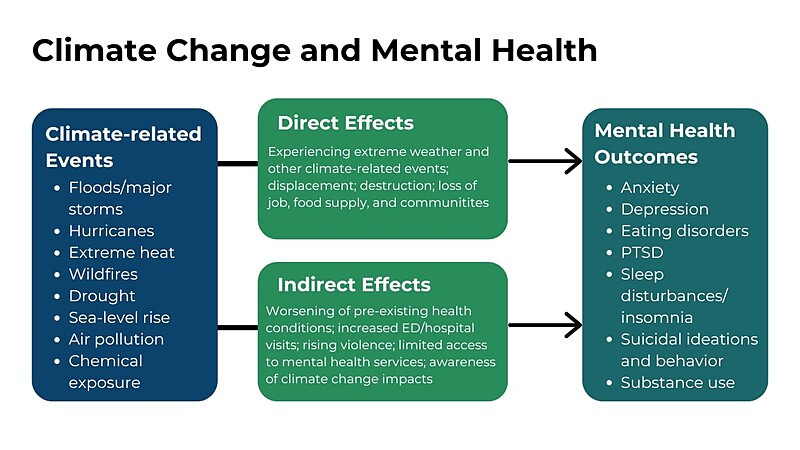Extreme weather events are becoming all too common, and the human consequences of climate change are now very evident — from job loss, displacement, and destruction of landscape and personal property to disconnection from social networks, communities, and resources.
Evidence of the mental health impacts of climate change continues to grow, as does the need to expand access to mental health services and offer support during these difficult times. Increasing awareness and understanding of the connection between mental health and climate change can help equip us for future climate-related events and maintain resiliency.
How climate change can affect our mental health
Populations located in areas particularly vulnerable to climate-related events face significant threats to their well-being, economic stability, food security, and infrastructure. These communities face increased stress, domestic violence, substance abuse, and forced migration. Weather events such as flooding and wildfires (see below) have been linked to mental health conditions like post-traumatic stress disorder (PTSD), anxiety, depression, and suicide.
Air pollution and elevated temperatures linked to rising greenhouse gasses have also been shown to increase the risk of neurological and psychiatric problems significantly. This includes strokes and dementia (e.g., Alzheimer's disease), as well as violent incidents and suicide attempts, and overall increased rates of mental health-related emergency department visits.
Notably, exposure to air pollution has also been associated with heightened anxiety levels, depression, suicide, and Parkinson’s disease, as well as possible links to psychosis, a greater likelihood of autism, and lower cognitive ability.
Chemical exposures — including lead, PFAS, and BPA — can also contribute to mental health symptoms such as anxiety and depression. For more information on how these exposures can specifically affect children’s mental health, see the recent CHE Alaska webinar Chemical Exposures and Children’s Mental Health.

Data: Adapted in part from World Health Organization, Mental Health and Climate Change: Policy Brief (WHO, June 2022) and American Psychiatric Association, Climate Change and Mental Health Connections (APA, May 2023).
Source: Emily Hough and Nathaniel Counts. How Climate Change Affects Our Mental Health, and What We Can Do About It (explainer). Commonwealth Fund. March 29, 2023.
Wildfires & mental health
From 1984 to 2017, the area affected annually by wildfires in the western United States has increased by approximately 1,000%, leading to the establishment of a distinct "fire season." Of the 20 largest wildfires in California’s history, eight have occurred since 2017. The August Complex Fire in 2020 stands as the largest wildfire ever recorded in California.
A study conducted after the California Camp Fire in 2018 found that 67% of individuals directly exposed to the fire reported experiencing recent trauma, in contrast to just 14% of those who were indirectly affected.
A more recent study conducted by Emory University examined the mental health impacts of wildfires across five states — California, Arizona, Nevada, Oregon, and Utah — between 2007 and 2018. The findings revealed a 6.3% increase in anxiety-related emergency department visits associated with wildfire events. Additionally, the study highlighted some concerning trends:
- Women, girls, and older adults are more susceptible to severe anxiety disorders associated with wildfires of any size.
- Men and boys experience an increase in anxiety disorders in the face of major wildfire events.
Floods & mental health
Another increasingly common type of climate disaster is flooding, which can have lasting and profound effects on individuals' mental health and well-being.
In 2023, approximately 32 million people worldwide were impacted by floods, facing injuries or losing their homes. Recently, Southeast Asia and Central Europe experienced severe flooding following Super Typhoon Yagi and Storm Boris, prompting urgent large-scale recovery efforts that include emergency shelter, healthcare, psychosocial support, and international solidarity.
Providing support during these challenging times is crucial, as research indicates that strong social networks can help mitigate the negative psychological effects of flooding.
Promoting resilience during climate change events
Actively supporting policies that address the causes of climate change is essential to preventing further harm to our world. Ensuring that mental health services are both available and accessible is also increasingly urgent. We’re all affected by the climate crisis in some way, and unfortunately, the number of those experiencing direct impacts continues to grow.
Here are a few action steps, curated by Harvard’s School of Public Health, to promote community resilience for climate-related trauma:
- Train teachers and healthcare workers to care for children or individuals who have experienced trauma
- Create accessible and well-maintained parks and playgrounds
- Provide more green space to improve well-being
If you or someone you know is experiencing the symptoms of climate anxiety or a mental health crisis, seek support from a therapist or trusted loved one, or contact the Suicide and Crisis Lifeline at 988. For those specifically looking for a therapist who is knowledgeable about the climate crisis, refer to this directory for climate-aware therapists in your area.
Explore the following resources for additional information.
- American Psychological Association (2017). Mental Health and Our Changing Climate: Impacts, Implications, and Guidance.
- Collaborative for Health & Environment (2023). Bold Ideas at the Intersection of Climate, Health, & Justice.
- Collaborative for Health & Environment (2024). Climate Anxiety 101: Understanding, recognizing, & managing environmental worry.
- See Change Institute (2022). Climate Change & Youth Mental Health Psychological Impacts, Resilience Resources and Future Directions.
Related webinars:
- Chemical Exposures and Children’s Mental Health. (CHE Alaska webinar, 2024)
- Agents of Change in Environmental Justice: Climate, Health, & Justice. (CHE & Agents of Change webinar, 2023)
Note: This is the second blog in a series on mental health impacts of climate change. See also Climate Anxiety 101: Understanding, recognizing, & managing environmental worry.


